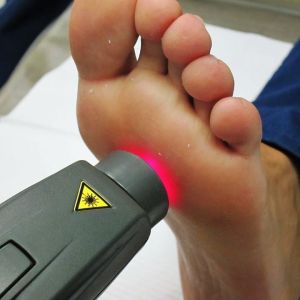Does Your Foot Pain Feel Like You are Walking on a Pebble? It Could be Morton’s Neuroma
The human foot is truly one of the most remarkable parts of the human body. This humble extremity allows people to stand, walk countless miles, and participate in a wide range of athletic activities. When a person’s feet are working well, they can engage in all of their daily activities without a thought to their feet. However, when foot pains occur, the person likely finds their daily activity level quickly grinding to a halt, or at least becomes a very difficult and painful pursuit. Although there are a myriad of conditions that can cause foot pain, Morton’s Neuroma is somewhat distinctive in that one of the main symptoms is a sensation of feeling as if one is walking on a pebble. In this post, we will outline what this condition is, some of the reasons why it occurs, and most importantly, how to resolve it.

Morton’s Neuroma Defined
Morton’s Neuroma is a painful foot condition. It involves the thickening of tissue around the nerves that lead to the toes. The area where this occurs is known as the ball of the foot, the part of the foot directly below the toe region. Morton’s Neuroma typically affects the area between the third and fourth (outer) toes. The defining symptom of Morton’s Neuroma is the sensation as if one is walking on a pebble, or perhaps a fold in one’s sock.
Women are much more likely to experience a case of Morton’s Neuroma. This is because they often wear footwear that pushes toes together and/or footwear that has high heels, which distributes a person’s body weight more toward the ball of the foot, rather than the heel. Other symptoms include burning pain in the affected area as well as having difficulty walking as the increased pressure from walking only puts more pressure on the irritated nerves. The nerve pain can also manifest as tingling or numbness in the toe region as well.

Solutions
Some people may find relief simply from rest, taking some NSAIDs, and switching from wearing ill-fitting footwear to wearing good-quality shoes. A quality shoe will have a lower heel, support, and provide plenty of space for the toes to reside. However, other people may ignore the symptoms until the condition becomes much more serious. Another factor that makes Morton’s Neuroma difficult to resolve is that it sometimes occurs in people who have some type of other foot deformities such as a bunion, hammertoe, or high arches. In these cases, until all the foot issues are resolved, the affected person will likely continue to experience pain from Morton’s Neuroma, along with their other foot issues.
For more difficult cases, a physician may recommend their patients undergo a series of physical therapy treatment sessions. During physical therapy, a therapist will evaluate the patient. First, they will determine if there are any other foot conditions aggravating their nerve pain. They will also ask the patient about the type of shoes they typically wear and the type of physical activities they engage in. The initial treatment may begin with pain-relieving treatments. Ultrasound, including phonophoresis, a procedure where topical drugs are applied through ultrasound in order to promote pain relief is an example. Other pain-relieving methods may include electrical stimulation, along with gentle stretches and manual therapy manipulations designed to increase range of motion and reduce pain. A physical therapist will also encourage the patient to invest in good-quality footwear that provides the proper cushioning for painful areas, a lower heel, as well as a wider toe box. They may also recommend some shoe orthotics that provide the proper support in key areas. As the patient begins to heal, the physical therapist will introduce strengthening exercises designed to resolve any areas of weakness throughout the foot and ankle regions.

Summary
If you would like more information on Morton’s Neuroma or if you’re experiencing foot pain that does not resolve after rest and switching to different footwear, we can help! Please contact Cawley Rehab at 570-208-2787 to make an appointment today.

